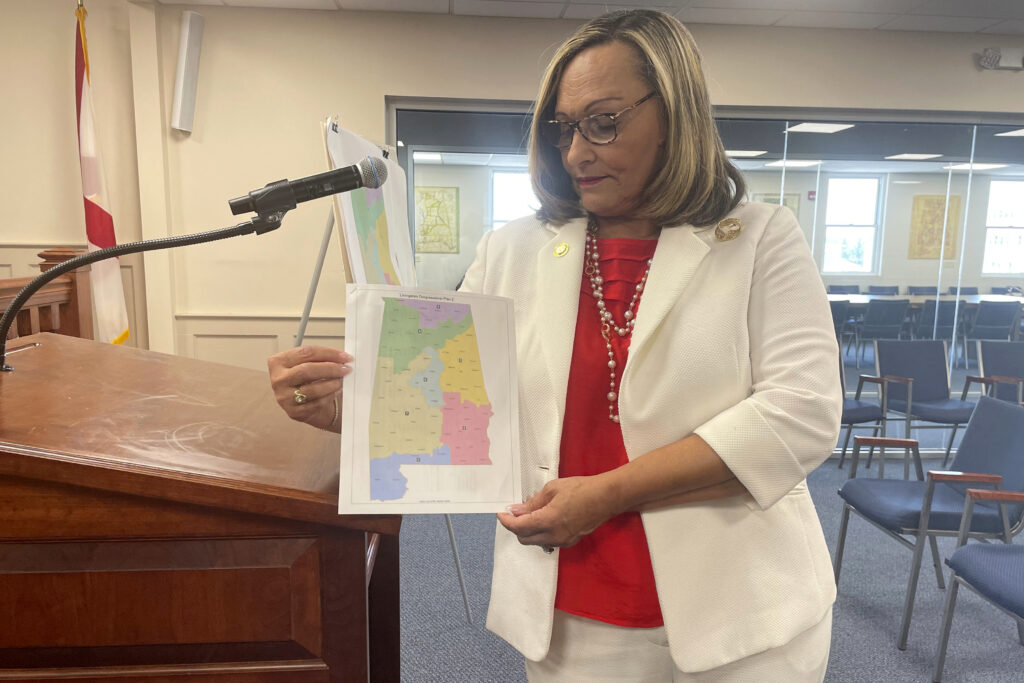
In a scathing ruling, a panel of three federal judges Thursday struck down Alabama’s 2023 congressional map as a violation of both the Voting Rights Act (VRA) and the 14th Amendment to the U.S. Constitution.
The judges — two of whom were appointed by President Donald Trump — excoriated the state for what they called “a deliberate decision to double down on the dilution of Black Alabamians’ votes.“
The unanimous decision strikes a blow for fair representation for Black voters in the state, and could lead to new restrictions on how Alabama makes future changes to its map.
The case dates back to November 2021, when voters and advocates sued to stop a map drawn by legislators after the 2020 census, arguing that it diluted the strength of Black voters in the state.
After a federal court and the U.S. Supreme Court struck down the map, the Alabama legislature defiantly enacted another map that was missing two majority Black districts.
The three-judge panel in the Northern District of Alabama found evidence of intentional racial discrimination in enacting the revised map, and ruled that the state should have two majority Black districts.
“[T]ry as we might, we cannot understand the 2023 Plan as anything other than an intentional effort to dilute Black Alabamians’ voting strength and evade the unambiguous requirements of court orders standing in the way,” the panel wrote.
If the ruling is upheld, Alabama may be returned to the VRA’s pre-clearance regime — meaning it would have to get congressional districting changes pre-approved by the Department of Justice or federal courts before they go into effect. The ruling said the court will determine that issue at a later date.
In its Thursday ruling, the panel went on to sharply rebuke the Alabama legislature for flouting court orders.
The judges wrote that it is “difficult to understand the Legislature’s decision to enact the 2023 Plan as anything other than a deliberate decision to double down on the dilution of Black Alabamians’ votes.”
“We also emphasize our concern about the State’s assertion that in response to any injunction we may issue, it is free to repeat its checkmate move,” the ruling stated. “We are troubled by the State’s view that even if we enter judgment for the Plaintiffs after a full trial, the State remains free to make the same checkmate move yet again — and again, and again, and again.”
The court added that the Alabama legislature “has raised the stakes of this litigation well beyond redistricting” and its decision to ignore court orders is “intolerable in our system of ordered liberty.”
Not only did judges find that Alabama was acting in bad faith, they also didn’t buy the state’s argument that private individuals aren’t authorized to file lawsuits under Section 2 of the Voting Rights Act. Instead, they concluded Alabama’s interpretation “would seriously disrupt longstanding and consistent federal law on this issue” and they reminded the state that they already rejected the same argument last year.
The court admonished Alabama for the avoidable outcome of being found once again in violation of federal law.
“The 2020 redistricting cycle in Alabama — the first cycle in 50 years that Alabama has been free of the strictures of federal preclearance — did not have to turn out this way,” the court wrote. “We wish it had not, but we have eyes to see the veritable mountain of evidence that it did.”
The plaintiffs in the lawsuit were represented by the Elias Law Group (ELG). ELG Firm Chair Marc Elias is the founder of Democracy Docket.
